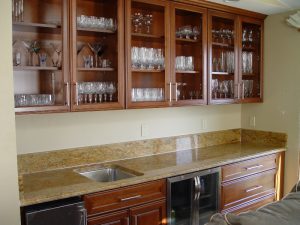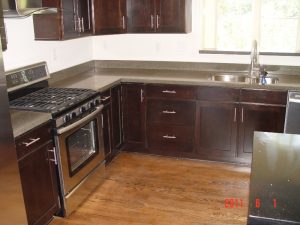
When it comes to home renovation projects, kitchens, often considered the heart of the family home, tend to be at the top of the list. Homeowners take much pride in showing off this natural gathering place for eating, studying and entertaining. As trends come and go, choosing a countertop that will outlast the latest kitchen craze will serve you well. Granite and concrete countertops are two of the most popular options. While both are excellent choices, at Lexmar USA, we strongly believe that granite has significant advantages over concrete. Let us explain why.

Concrete is a porous material, which means that it can absorb liquid, bacteria and mold. If not properly sealed, the constant wear and tear will begin to weaken the surface and, in some cases, may become unsafe for food preparation. Additionally, fractures are a risk when it comes to concrete countertops. Reasons vary from the concrete being poured in place as opposed to being pre-cast, pressure on the concrete surface or simply the natural movement of your house settling.
Even though both concrete and granite are durable, heat-resistant and less vulnerable to scratches than other materials, they do require proper maintenance to be fully effective. However, overtime, granite countertops require less maintenance than concrete countertops. After an annual sealing application, granite is pretty much maintenance free. It can be cleaned with soap and water.
Concrete requires a bit more maintenance. After sealing the surface upon initial installation, concrete must be sealed every one to three years. Additionally, due to its porous nature, the surface should be waxed on a monthly basis. The sealant and monthly waxing help to prevent the surface from absorbing liquid, bacteria, mold and other stains.
Even though both surfaces are heat-resistant, it is important to note that sealed granite is more heat-resistant than sealed concrete. Therefore, it is important to use a trivet to protect your concrete countertop. By not doing so, the sealant that protects the surface from stains and spills can be damaged from the heat.

The ability of concrete to be mixed and cast from aggregate and polished to a smooth surface allows a concrete countertop to be made into any color or pattern. While this may be a plus for some, depending on your style of home, it also gives off an industrial feel, which is not compatible with more traditional décor. Additionally, concrete develops a patina, a discoloration of the surface over time—which some homeowners embrace and others do not. It is unavoidable, though, as it comes from every day wear.
One of the downsides of concrete countertops stems from its porous nature again. No matter how much you seal your concrete countertop, it will inevitably show markings and stains from spills.
With proper maintenance and preventative measures, such as the use of trivets, concrete and granite countertops should last for many years. They are extremely durable and strong. Due to its porous nature and patina developing over time, concrete is more susceptible to scratches, cracks and stains. Therefore, granite often outlasts concrete in durability and appearance.
The costs of granite and concrete are fairly close, with the initial product cost possibly being slightly higher for granite. Because concrete takes longer to mold, cure, smooth and polish, the installation costs are often higher for concrete countertops. The additional cost-savings for granite comes with having to do less maintenance and repairs to the surface.
Lexmar USA, located in McKeesport, PA, has been providing the highest quality granite countertops in the Pittsburgh area for many years. Whatever your project, Lexmar USA can help you decide on the perfect countertop solution, and at the best prices. If you would like an estimate or more information on the differences between concrete and granite countertops, please contact our team at 412-896-9266.